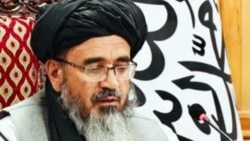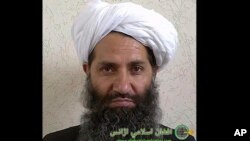The chief prosecutor of the International Criminal Court announced Thursday that he is seeking arrest warrants for high-ranking Taliban leaders in Afghanistan accused of crimes against humanity, citing widespread discrimination against the country’s female population.
Karim Khan identified the suspects as the Taliban supreme leader, Hibatullah Akhundzada, and his chief justice, Abdul Hakim Haqqani, saying his action is based on a thorough investigation and evidence collected in the process.
“My Office has concluded that these two Afghan nationals are criminally responsible for persecuting Afghan girls and women … and persons whom the Taliban perceived as allies of girls and women,” Khan stated.
He noted that the persecution has been ongoing since August 2021, when the Taliban regained control of Afghanistan and imposed their strict interpretation of Islamic law, or Sharia.
Khan said, without elaborating, that his office would soon file additional applications seeking arrests of other senior Taliban members.
ICC judges are now required to review the applications before deciding whether to issue an arrest warrant for Akhundzada and Haqqani. Experts anticipate the process could take weeks or even months.
“These applications recognize that Afghan women and girls, as well as the LGBTQI+ community, are facing an unprecedented, unconscionable, and ongoing persecution by the Taliban,” Khan stated.
“Our action signals that the status quo for women and girls in Afghanistan is not acceptable. Afghan survivors, in particular women and girls, deserve accountability before a court of law,” added the chief prosecutor.
The Hague-based ICC is mandated to rule on the world’s worst offenses, such as war crimes and crimes against humanity. The court has no police force and relies on its 125 member states to execute its arrest warrants.
Taliban officials did not immediately offer any response to the ICC announcement.
Akhundzada, who governs the country from the southern city of Kandahar, has issued numerous edicts over the past three-and-a-half years, imposing extensive restrictions on Afghan women and girls that the United Nations has condemned as “gender apartheid.”
Girls are banned from pursuing education beyond the sixth grade, including attending institutions that train midwives and nurses. Most women are prohibited from working in both the public and private sectors. They are blocked from visiting public parks, gyms, and baths.
The Taliban have mandated that females cover their faces in public and that they cannot travel long distances without a male guardian — making Afghanistan the only country in the world to impose such bans on women and girls.
The U.N. and global rights groups have condemned the bans and demanded the Taliban reverse their restrictions on women, saying they are a key sticking point in the Afghan authorities’ pursuit of official recognition for their government in Kabul.
The Taliban have vehemently defended their governance, asserting that their policies align with Sharia and Afghan culture. Taliban leaders say all Afghan citizens’ rights are provided for under Islamic law.




